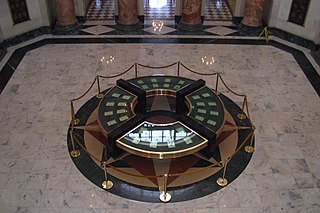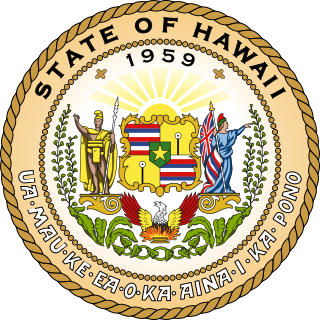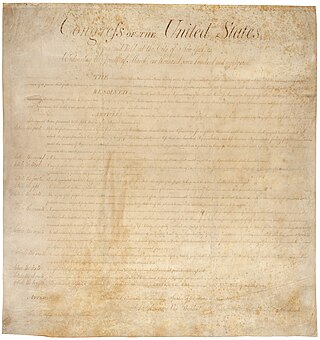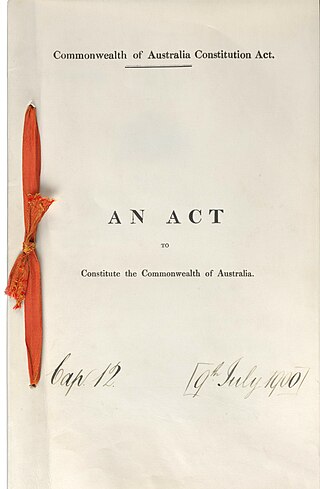
The Constitution of Ireland is the fundamental law of Ireland. It asserts the national sovereignty of the Irish people. It guarantees certain fundamental rights, along with a popularly elected non-executive president, a bicameral parliament, a separation of powers and judicial review.
The Constitution of the Commonwealth of Massachusetts is the fundamental governing document of the Commonwealth of Massachusetts, one of the 50 individual states that make up the United States of America. It consists of a preamble, declaration of rights, description of the principles and framework of government, and articles of amendment. It is the highest legal authority in the state, subordinate only to the U.S. Constitution.

The Constitution of the Commonwealth of Puerto Rico is the controlling government document of Puerto Rico. It is composed of nine articles detailing the structure of the government as well as the function of several of its institutions. The document also contains an extensive and specific bill of rights. It was ratified by Puerto Rico's electorate in a referendum on March 3, 1952, and on July 25, 1952, Governor Luis Muñoz Marín proclaimed that the constitution was in effect. July 25 is known as Constitution Day.

The Constitution of the State of Hawaii, also known as the Hawaii State Constitution, is the fundamental governing document of the U.S. state of Hawaiʻi. As an organic text, it establishes the principles and framework of government, enumerates the rights and freedoms of Hawaiian citizens, and serves as the supreme law of the state.
Australian constitutional law is the area of the law of Australia relating to the interpretation and application of the Constitution of Australia. Legal cases regarding Australian constitutional law are often handled by the High Court of Australia, the highest court in the Australian judicial system. Several major doctrines of Australian constitutional law have developed.

The second question of the 1967 Australian referendum of 27 May 1967, called by the Holt government, related to Indigenous Australians. Voters were asked whether to give the Commonwealth Parliament the power to make special laws for Indigenous Australians in states, and whether Indigenous Australians should be included in official population counts for constitutional purposes. The term "the Aboriginal Race" was used in the question.
In Australia, referendums are public votes held on important issues where the electorate may approve or reject a certain proposal. In contemporary usage, polls conducted on non-constitutional issues are known as plebiscites, with the term referendum being reserved solely for votes on constitutional changes, which is legally required to make a change to the Constitution of Australia.
The Constitution Alteration Bill 1910, was put to voters for approval in a referendum held in the 1911 referendums. The bill sought to alter the Australian Constitution to extend the Commonwealth power in respect of trade and commerce, the control of corporations, labour and employment and combinations and monopolies. All of the proposed changes were contained within the one question.
The Constitution Alteration Bill 1912, was an unsuccessful referendum held in 1913 that sought to alter the Australian Constitution to give the Commonwealth legislative power in respect to monopolies.
The Constitution Alteration (Marketing) Bill 1936, was an unsuccessful proposal to alter the Australian Constitution to ensure that the Commonwealth could continue legislative schemes for the marketing of agricultural produce such as the quota for dried fruits. It was put to voters for approval in a referendum held on 6 March 1937.
The Fundamental Rights in India enshrined in part III of the Constitution of India guarantee civil liberties such that all Indians can lead their lives in peace and harmony as citizens of India. These rights are known as "fundamental" as they are the most essential for all-round development i.e., material, intellectual, moral and spiritual and protected by fundamental law of the land i.e. constitution. If the rights provided by Constitution especially the Fundamental rights are violated the Supreme Court and the High Courts can issue writs under Articles 32 and 226 of the Constitution, respectively, directing the State Machinery for enforcement of the fundamental rights.

The United States Bill of Rights comprises the first ten amendments to the United States Constitution. Proposed following the often bitter 1787–88 debate over the ratification of the Constitution and written to address the objections raised by Anti-Federalists, the Bill of Rights amendments add to the Constitution specific guarantees of personal freedoms and rights, clear limitations on the government's power in judicial and other proceedings, and explicit declarations that all powers not specifically granted to the federal government by the Constitution are reserved to the states or the people. The concepts codified in these amendments are built upon those in earlier documents, especially the Virginia Declaration of Rights (1776), as well as the Northwest Ordinance (1787), the English Bill of Rights (1689), and Magna Carta (1215).

The Constitution of Australia is the fundamental law that governs the political structure of Australia. It is a written constitution, that establishes the country as a federation under a constitutional monarchy governed with a parliamentary system. Its eight chapters sets down the structure and powers of the three constituent parts of the federal level of government: the Parliament, the Executive Government and the Judicature.

The Constitution of Uzbekistan was adopted on 8 December 1992 on the 11th session of the Supreme Council of Uzbekistan. It replaced the Constitution of the Republic of Uzbekistan of 1978. It is the supreme law of the Republic of Uzbekistan. The Constitution of Uzbekistan contains six parts and it is further divided into 26 chapters.
Section 116 of the Constitution of Australia precludes the Commonwealth of Australia from making laws for establishing any religion, imposing any religious observance, or prohibiting the free exercise of any religion. Section 116 also provides that no religious test shall be required as a qualification for any office or public trust under the Commonwealth. The product of a compromise in the pre-Federation constitutional conventions, Section 116 is based on similar provisions in the United States Constitution. However, Section 116 is more narrowly drafted than its US counterpart, and does not preclude the states of Australia from making such laws.
The Vicinage Clause is a provision in the Sixth Amendment to the United States Constitution regulating the vicinity from which a jury pool may be selected. The clause says that the accused shall be entitled to an "impartial jury of the State and district wherein the crime shall have been committed, which district shall have been previously ascertained by law". The Vicinage Clause limits the vicinity of criminal jury selection to both the state and the federal judicial district where the crime has been committed. This is distinct from the venue provision of Article Three of the United States Constitution, which regulates the location of the actual trial.
Freedom of religion in Australia is allowed in practice and protected to varying degrees through the constitution and legislation at the Federal, state and territory level. Australia is a pluralist country with legislated principle of state neutrality and with no state religion. The nation has over 13.6 million people who identify as religious and over 9.8 million who identify with no religion.

The Constitution Alteration 1988 was an unsuccessful proposal put to referendum in the 1988 Australian referendum on 3 September 1988. It proposed to alter the Australian constitution so that both the House of Representatives and the Senate would be elected for a term of four years. This involved reducing the terms of the Senate from six years to four years, and increasing the terms of the House of Representatives from three years to four years. It also proposed for the fourth time that Senate and House elections occur simultaneously.

The Constitution Alteration Bill 1988, was an unsuccessful proposal to alter the Australian Constitution to enshrine the principle that each elector's vote should have equal value in Australia, also referred to as one vote, one value, including in states and territories. It was put to voters for approval in a referendum held on 3 September 1988.

The Constitution Alteration Bill 1988, was an unsuccessful proposal to alter the Australian Constitution to recognise local government. It was put to voters for approval in a referendum held on 3 September 1988. The structure of the Constitution recognises government at federal and state levels, but makes no mention of local government.










